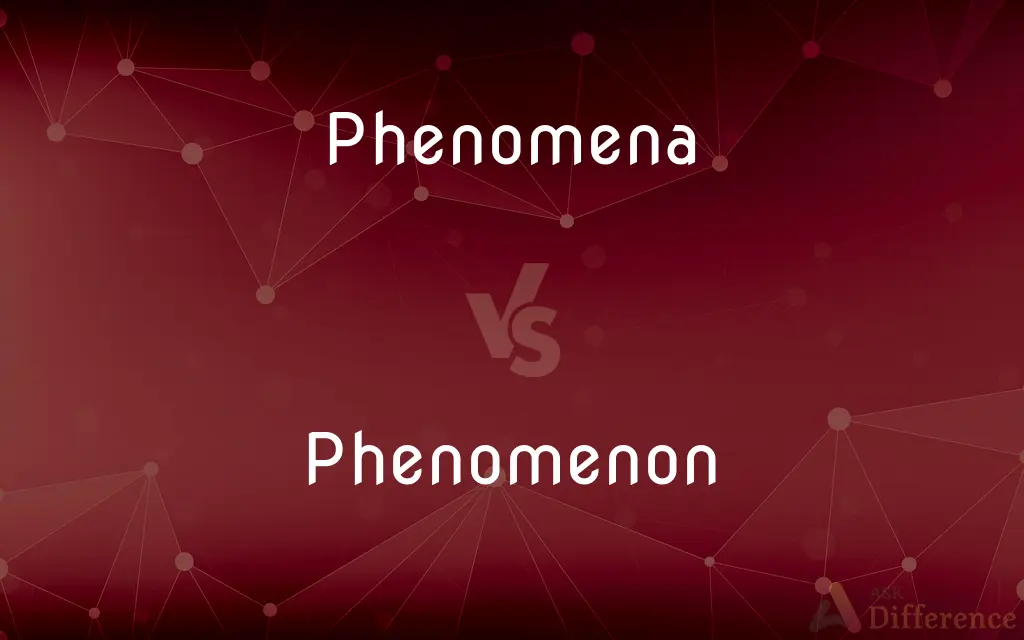Phenomena vs. Phenomenon — What's the Difference?
Edited by Tayyaba Rehman — By Fiza Rafique — Updated on November 1, 2023
"Phenomenon" is a singular noun referring to a singular event or fact, while "phenomena" is its plural form, referring to multiple events or facts.

Difference Between Phenomena and Phenomenon
Table of Contents
ADVERTISEMENT
Key Differences
"Phenomena" and "Phenomenon" are terms used to describe observable events or occurrences. "Phenomena" is the plural form, referring to multiple events, such as the Northern Lights or migrations. "Phenomenon," on the other hand, describes a single event, like a solar eclipse. Both words stem from Greek origins, where "phainomenon" means "that which appears."
Both "phenomena" and "phenomenon" are used in scientific and philosophical discussions. Scientists might study various phenomena (plural) in nature, ranging from physical to biological occurrences. When they focus on a specific case, such as the phenomenon (singular) of gravity, they analyze its principles and effects in detail.
In everyday language, "phenomena" can refer to a range of happenings or subjects that spark interest or observation. Examples include cultural trends or social movements. Conversely, when someone refers to a "phenomenon," they are often pointing out a particular, remarkable event, like a viral Internet trend.
The usage of "phenomena" versus "phenomenon" depends on the context. In journalism, one might report on economic phenomena, encompassing various related events. But if the story is about a unique economic "phenomenon," the singular form highlights its uniqueness.
While both words share a common theme of observability, "phenomena" usually suggests a broader scope, whereas "phenomenon" implies a more focused examination. Authors discussing multiple instances of natural wonders would use "phenomena," but when explaining a specific natural wonder, they would use "phenomenon."
ADVERTISEMENT
Comparison Chart
Number
Plural
Singular
Definition
Refers to multiple observable events or occurrences
Refers to a single observable event or occurrence
Usage in a Sentence
"The phenomena of climate change include rising temperatures."
"A total solar eclipse is a rare phenomenon."
Usage in Scientific Text
Used to describe various instances within a study
Used to describe a specific instance within a study
Example in Nature
The aurora borealis and migration are natural phenomena.
The blooming of a rare flower is a natural phenomenon.
Compare with Definitions
Phenomena
Observable occurrences in nature or society.
The phenomena of bioluminescence can be seen in fireflies.
Phenomenon
A singular event that is extraordinary or remarkable.
The supernova was an astronomical phenomenon.
Phenomena
Manifestations or aspects of a particular subject.
The phenomena of globalization affect international relations.
Phenomenon
An occurrence that is a manifestation of a principle or process.
The phenomenon of condensation is part of the water cycle.
Phenomena
Subjects of study in various scientific fields.
Psychological phenomena are key to understanding human behavior.
Phenomenon
A unique or significant trend or fact in society.
The sudden popularity of the game became a cultural phenomenon.
Phenomena
Events or facts that are notable for their scientific interest.
Astrophysical phenomena like black holes fascinate scientists.
Phenomenon
A phenomenon (Greek: φαινόμενον, romanized: phainómenon, lit. 'thing appearing to view'; plural phenomena) is an observable fact or event. The term came into its modern philosophical usage through Immanuel Kant, who contrasted it with the noumenon, which cannot be directly observed.
Phenomena
Exceptional or remarkable events or circumstances.
Technological phenomena have drastically shaped the 21st century.
Phenomenon
An occurrence, circumstance, or fact that is perceptible by the senses.
Phenomena
Plural of phenomenon.
Phenomenon
An unusual, significant, or unaccountable fact or occurrence; a marvel.
Phenomenon
A remarkable or outstanding person; a paragon.
Phenomenon
(Philosophy) In the philosophy of Kant, an object as it is perceived by the senses, as opposed to a noumenon.
Phenomenon
(Physics) An observable event.
Phenomenon
A thing or being, event or process, perceptible through senses; or a fact or occurrence thereof.
Phenomenon
(by extension) A knowable thing or event eg by inference, especially in science
An electromagnetic phenomenon.
Phenomenon
A kind or type of phenomenon sense 1 or 2
A volcanic eruption is an impressive phenomenon.
Phenomenon
Appearance; a perceptible aspect of something that is mutable.
Phenomenon
A fact or event considered very unusual, curious, or astonishing by those who witness it.
Phenomenon
A wonderful or very remarkable person or thing.
Phenomenon
An experienced object whose constitution reflects the order and conceptual structure imposed upon it by the human mind (especially by the powers of perception and understanding).
Phenomenon
An appearance; anything visible; whatever, in matter or spirit, is apparent to, or is apprehended by, observation; as, the phenomena of heat, light, or electricity; phenomena of imagination or memory.
In the phenomena of the material world, and in many of the phenomena of mind.
Phenomenon
That which strikes one as strange, unusual, or unaccountable; an extraordinary or very remarkable person, thing, or occurrence; as, a musical phenomenon.
Phenomenon
Any state or process known through the senses rather than by intuition or reasoning
Phenomenon
A remarkable development
Phenomenon
An observable fact or occurrence in science.
Magnetism is a phenomenon that can be demonstrated with iron filings.
Phenomenon
Something notable for its uniqueness or peculiarity.
The child prodigy’s talents were considered a phenomenon.
Common Curiosities
Can "phenomena" be used when talking about one event?
No, "phenomena" refers to multiple events.
How do you pronounce "phenomenon"?
It’s pronounced /fəˈnɒm.ənɒn/.
What is the singular form, "phenomenon" or "phenomena"?
"Phenomenon" is the singular form.
Is "phenomena" ever correct when referring to something unique?
No, "phenomenon" should be used for something unique.
What is the plural of "phenomenon"?
The plural is "phenomena."
How do you use "phenomenon" in a sentence?
Example: "The eclipse is a natural phenomenon."
Is "phenomena" ever used colloquially for emphasis?
Rarely, and usually incorrectly, as it should refer to multiple events.
Is the use of "phenomenon" limited to scientific contexts?
No, it can be used in any context to describe a notable event.
In scientific papers, should I use "phenomena" or "phenomenon"?
It depends on whether you are referring to multiple events ("phenomena") or a single event ("phenomenon").
Are "phenomenon" and "phenomena" interchangeable?
No, they are not interchangeable as they signify different numbers.
What is an example of "phenomena"?
Northern Lights and star patterns are natural phenomena.
Do "phenomena" and "phenomenon" have the same origin?
Yes, they both come from the Greek word "phainomenon."
Can "phenomena" be used in formal writing?
Yes, when referring to more than one event.
What part of speech is "phenomenon"?
It is a noun.
How can I remember the difference between "phenomenon" and "phenomena"?
"Phenomenon" is for one event; "phenomena" for many, like "criterion" (singular) and "criteria" (plural).
Share Your Discovery

Previous Comparison
Orangutan vs. Gorilla
Next Comparison
Velvet vs. VelourAuthor Spotlight
Written by
Fiza RafiqueFiza Rafique is a skilled content writer at AskDifference.com, where she meticulously refines and enhances written pieces. Drawing from her vast editorial expertise, Fiza ensures clarity, accuracy, and precision in every article. Passionate about language, she continually seeks to elevate the quality of content for readers worldwide.
Edited by
Tayyaba RehmanTayyaba Rehman is a distinguished writer, currently serving as a primary contributor to askdifference.com. As a researcher in semantics and etymology, Tayyaba's passion for the complexity of languages and their distinctions has found a perfect home on the platform. Tayyaba delves into the intricacies of language, distinguishing between commonly confused words and phrases, thereby providing clarity for readers worldwide.
















































